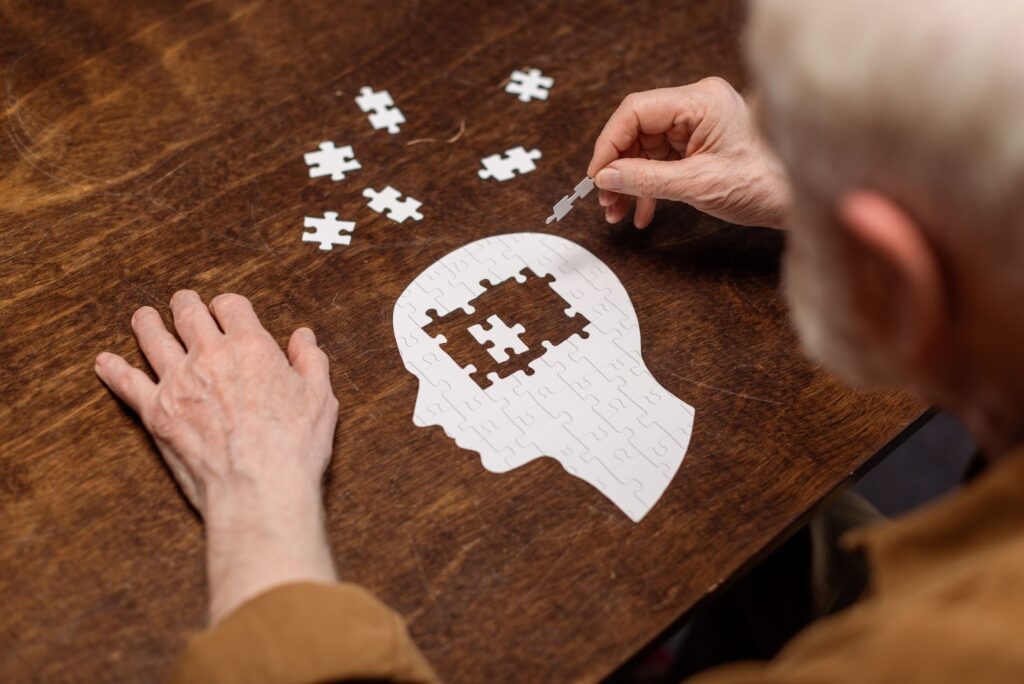For families, making informed decisions about a loved one’s well-being and care is crucial. To help understand the best community fit for your loved one, it’s important to recognize the different types of care communities and their focus on care.
Memory care is focused on providing personalized, quality care to individuals experiencing cognitive decline due to conditions such as Alzheimer’s, dementia, and Parkinson’s in a long-term care environment.
Nursing homes provide quality care to individuals requiring daily assistance due to severe health conditions or temporary or long-term injuries.
What Is Memory Care?
Memory care is a specialized form of long-term care aimed at addressing the unique needs of older adults experiencing memory decline due to cognitive impairments such as Alzheimer’s disease, dementia, and Parkinson’s disease.
Our community focuses on a holistic approach to memory care that helps address our residents’ physical, mental, and social well-being. We work to provide a safe and supportive environment where residents can receive care that can help them maintain their quality of life.
Personalized Approach to Care
The progressive nature of these cognitive conditions means there may come a time when your loved one is unable to safely live independently. Living in a memory care community allows them to live in a safe space where on-site medical support and assistance are available 24/7 based on their specific wants and needs.
Every resident’s experience with cognitive impairment is different. This is why we take a personalized approach to care to help meet the unique needs of every individual.
Some common assistance and care components that are found in memory care include:
- Personal care assistance: Help with daily living activities such as dressing, bathing, and grooming.
- Physical health assistance: Routine health check-ups and preventive care to monitor and maintain physical health. Residents are encouraged to engage in forms of physical activity to help promote mobility and strength.
- Behavior modification and cognitive support: Using cognitive redirection strategies and behavioral intervention to manage symptoms of dementia associated with behavior and mood. Residents are exposed to stimulating activities like brain games to help maintain cognitive function.
- Social activities: Residents can engage in activities such as music therapy, art therapy, arts and crafts, gardening, and sensory therapies to stimulate the mind and help promote socialization and community to prevent isolation, which is common among older adults experiencing cognitive decline.
Safety Measures
Memory care communities are equipped to handle the complex needs of individuals with cognitive impairments. Staff are specially trained to deal with:
- Behavioral changes: Adapting strategies to manage new or worsening behaviors.
- Difficulty sleeping: Helping residents maintain a healthy sleep routine.
- Mood changes: Understanding and managing sudden emotional changes.
- Wandering: Checking to make sure residents don’t get lost or endanger themselves.
Memory care uses advanced safety measures to provide a safe environment for older adults, including specialized support bars along hallways, continuous staff monitoring, and emergency response systems. These measures are particularly important for residents prone to injuries, falls, wandering, or getting lost.
What Is a Nursing Home?
A nursing home, also called a skilled nursing facility, is designed to provide high levels of medical care and personal care and support to residents who require significant assistance with their daily activities and healthcare needs.
Nursing homes provide care for individuals experiencing severe health issues or chronic health conditions, those recovering from surgery or illness, and those who require constant medical supervision.
Residents can stay in a nursing care community either temporarily or long-term, depending on their unique circumstances.
The services we see most commonly provided in a nursing home include:
- Assistance with daily living: Residents are provided support with activities of daily living like bathing, dressing, grooming, and eating.
- Medical care: Due to the health status of many residents, extensive medical services are provided, including wound care, IV therapy, and medication management, under the supervision of physicians and nurses.
- Rehabilitation: Physical, occupational, and speech therapy is available to help residents regain or maintain their mobility and physical well-being.
Key Differences Between Memory Care & Nursing Homes
While there is some overlap between these two levels of care, what makes memory care different is its specialized focus on care for individuals experiencing various cognitive decline levels.
The key differences between memory care and nursing homes include the focus of care, staff training, environment, and activities and programs.
Our focus of care is different:
- Memory care: Specializes in caring for individuals with memory-related conditions, focusing on cognitive support and safety.
- Nursing homes: Provide comprehensive medical care for individuals with chronic health conditions or rehabilitation.
The staff are trained to handle different responsibilities:
- Memory care: Staff are trained to manage cognitive impairments and behavioral issues.
- Nursing homes: Staff are trained in general medical care and rehabilitation
In both care communities, staff are available 24/7 to help assist residents who require support for daily activities and medication management.
The environment in both is different:
- Memory care: Our space is designed for long-term care to provide a safe and calming environment to prevent residents from falling or wandering.
- Nursing homes: These may resemble a clinical setting environment more than a residential home. Residents can stay in nursing homes temporarily or for long-term care.
Memory care and nursing homes both offer therapy options for residents, but the goals of therapy are different:
- Memory care: Offers therapies aimed at cognitive stimulation and social engagement, like art therapy and music therapy.
- Nursing homes: Provides physical therapy and activities designed to improve physical health and mobility.
Schedule a Tour!
Choosing between memory care and nursing home options is a big decision for families and caregivers. It’s important to understand the specific needs of your loved ones and how each community works to address them. Our team is happy to provide guidance. Schedule a tour at The Fairway at Naples to learn more about memory care living.

